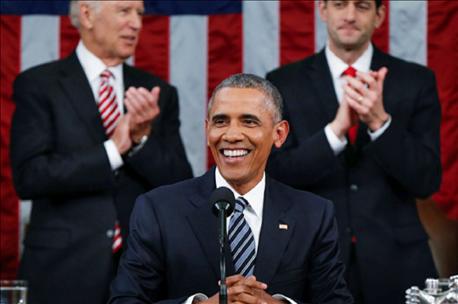
President Barack Obama’s final "State of the Union" address highlighted among other things the need for Congress to pass the Trans-Pacific Partnership (TPP) and to address global issues such as climate change.
With TPP, “China doesn’t set the rules in that region, we do”, expressed the President, calling the agreement an opportunity to exert strength. “You want to show our strength in this new century? Approve this agreement. Give us the tools to enforce it. It's the right thing to do,” Obama told members of Congress.”

President Obama gave his final State of the Union address on Jan. 12 and discussed among other things TPP, ending the Cuba trade embargo and advancements made on climate change collaboration.
The TPP mention received scattered applause from members of Congress, although most on the Democratic side stayed silent. The President faces an uphill battle on TPP passage due to the political climate fostered by the 2016 elections and the shortened congressional calendar.
He noted that the TPP agreement opens up markets, protects workers and the environment and advances American leadership in Asia.
In a call Wednesday afternoon after the speech, Secretary of Agriculture Tom Vilsack urged small business leaders to continually tell their stories of the benefits that can be realized under TPP. Vilsack said the timing of TPP passage is “critically important” and reiterated that member countries of the TPP discussions are watching for American leadership to get the deal across the finish line.
American Soybean Assn. president Richard Wilkins said the commitment of this Administration to trade is something his group has appreciated at every turn, and the President's final "State of the Union" address shows that course will continue throughout the year.
"We understand that the Trans-Pacific Partnership is going to be a heavy lift this year, but we are excited to continue our press to see it passed by our Congress and ratified,” Wilkins said. "The promise of the TPP for soybean farmers is too great to accept anything less, and we are very encouraged to hear the President continue his focus on the TPP in the year to come."
He added, "Soy benefits from the TPP in three ways: first, through an increase in the direct export of soybeans and soy products to the 11 TPP nations, which already account for $5.4 billion in annual soy exports. Second, and perhaps more importantly, the TPP will significantly expand meat exports to the region, which drives demand for soy meal as livestock feed here in the U.S. Finally, the TPP will foster long-term demand through the further development of the emerging economies within the region."
Cuba
Another trade highlight in the President’s speech was the call on Congress to lift the embargo on Cuba, where a self-imposed embargo has limited the ability to sell to the island nation's 11 million people just 90 miles from American shores. Earlier this year, the President restored diplomatic relations with the island nation, reopening the U.S. embassy.
In the speech, the President noted that the isolation of Cuba has only hurt relations with Latin American countries instead of promoting democracy. “Fifty years of isolating Cuba had failed to promote democracy and set us back in Latin America,” he said.
During this legislative session, Congress has introduced more than 10 bills related to trade expansion in Cuba.
Vilsack said Cuba is an opportunity to “retake an agricultural priority and trading area” where the U.S. used to dominate in exports. Cuba imports 80% of its foods, and imports of products like poultry, rice and many others from the U.S. could increase significantly because of the competitive closeness, especially compared to the European Union or South America, Vilsack said.
“So, if you want to consolidate our leadership and credibility in the hemisphere, recognize that the Cold War is over. Lift the embargo,” Obama told Congress.
Climate change
Obama further focused on how the nation needs to reignite the spirit of innovation to meet the biggest challenges, including climate change. He pointed out that climate change is just one of many issues where U.S. security is linked to the rest of the world.
In his speech, Obama noted that “60 years ago, when the Russians beat us into space, we didn't deny Sputnik was up there. We didn't argue about the science or shrink our research and development budget. We built a space program almost overnight, and 12 years later, we were walking on the moon.”
National Farmers Union president Roger Johnson welcomed the spotlight on climate change, saying, “We are greatly appreciative of the Administration's focus on climate change. Their efforts to help mitigate climate change will give family farmers and ranchers a better shot at ensuring global food security. Family farmers and ranchers can employ numerous practices that reduce or sequester carbon when given the correct incentives."
About the Author(s)
You May Also Like






